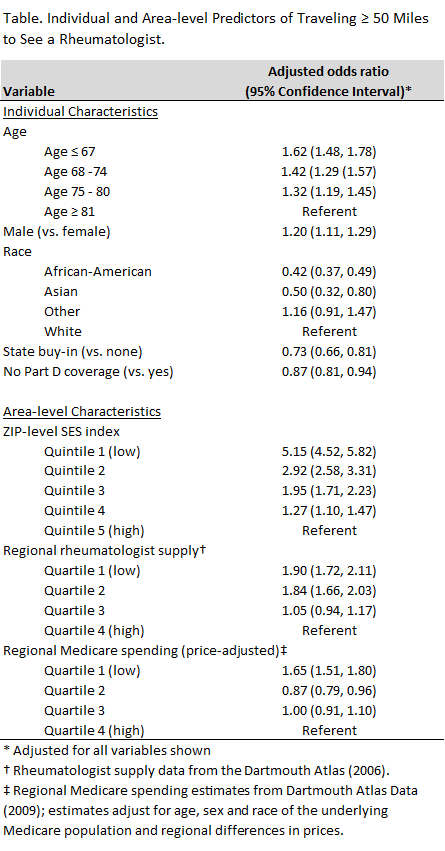Background/Purpose: Studies of the distribution of rheumatologists across the United States suggest that a significant number of patients travel long distances to visit a rheumatologist. The geographic, health care market, and patient factors associated with travel distances have not been described. We examined individual and area-level predictors of travelling long distances to see a rheumatologist.
Methods: Data derive from nationwide Medicare fee-for-service medical claims for 2009 for a 5% random sample of beneficiaries. All patients ≥ age 18 with 12 months of continuous enrollment in Medicare Parts A and B who had at least 1 visit to a rheumatologist were included. We calculated distance between the center of the patient’s 5-digit ZIP code and the center of the rheumatologist’s office 5-digit ZIP code for the first rheumatologist seen during the calendar year. We compared the characteristics of patients travelling ≥ 50 miles to see a rheumatologist to all others based on sociodemographic (age, sex, race, dual Medicare/Medicaid eligibility, and state buy-in, a measure of personal income) and area-level variables (ZIP-code level socioeconomic status, state-level supply of rheumatologists per 100,000 residents, state-level price-adjusted total Medicare spending per person). Two percent of observations were censored due to missing data. Included variables were tested for noncolinearity. We used general estimating equations to adjust for individual and area level characteristics in a single multivariate model.
Results: We studied 42,571 Medicare patients who had at least one visit to a rheumatologist during 2009. Median distance traveled was 9.3 miles (IQR 4-22); 9% of patients travelled ≥50 miles to see a rheumatologist. Patients who travelled ≥50 miles were more likely to be younger (age 70.7 vs. 73.3) male (25% vs 20%), White (92% vs. 88%), and live in a low-SES ZIP code (40% vs. 21%). They were also more likely to reside in regions with the lowest supply of rheumatologists (34% vs. 23%). In the adjusted model, the effects of age, sex, race, area-level SES, and rheumatologist supply remained significant although area-level SES had the strongest effect (Table).
Conclusion: Patients travelling very long distances to visit a rheumatologist are more likely to be male, White, and live in lower-SES areas compared to patients travelling less far. Sociodemographic effects are at least as strong as the effect of low rheumatologist supply. These findings suggest that interventions beyond increasing the number of rheumatologists in low supply areas will be necessary to reduce travel distances and improve access to rheumatology care in the U.S.
Disclosure:
G. Schmajuk,
None;
C. Tonner,
None;
J. Yazdany,
None.
« Back to 2014 ACR/ARHP Annual Meeting
ACR Meeting Abstracts - https://acrabstracts.org/abstract/characteristics-of-medicare-beneficiaries-travelling-long-distances-to-visit-a-rheumatologist/

